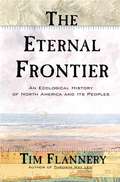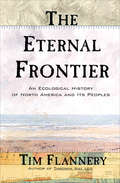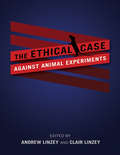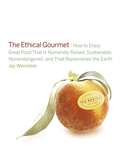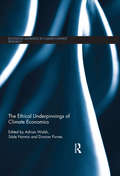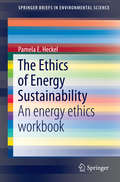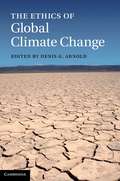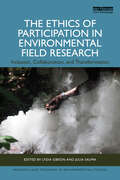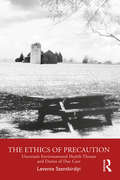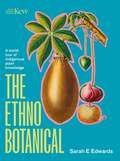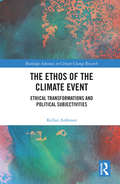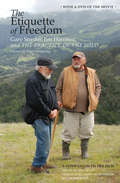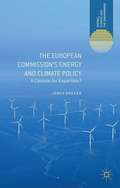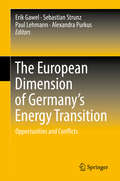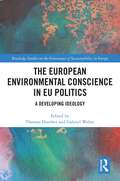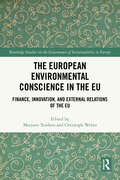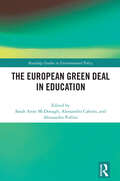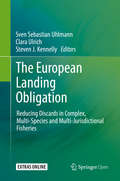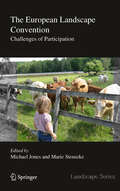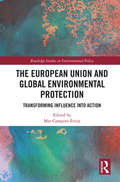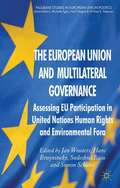- Table View
- List View
The Essential Outdoor Gear Manual: Equipment Care and Repair for Outdoorspeople
by Annie GetchellThis book covers repairs on the trail or at home. Techniques range from patching a rain jacket to patching a canoe, fixing broken zipper slides to reweaving snowshoe webbing, cleaning campstove jets to filing ice axe teeth. Getchell augments her concise hands-on instructions with numerous anecdotes from outdoor experts, creating a rich, captivating blend of field-based, real-world knowledge guidance. This comprehensive, multisport reference covers climbing hardware, tents, sleeping bags, hiking boots, binoculars, to name a few. The emphasis is as much on care as repair, since more of the former means less of the latter. Appendices offer trail-tested repair kits for specific activities, knots stitches, adhesives, nontoxic cleaning solutions.
The Essential T.S. Eliot
by T.S. EliotA selection of the most significant and enduring poems from one of the twentieth century’s major writers, chosen and introduced by Vijay SeshadriT.S. Eliot was a towering figure in twentieth century literature, a renowned poet, playwright, and critic whose work—including “The Love Song of J. Alfred Prufrock” (1915), The Waste Land (1922), Four Quartets (1943), and Murder in the Cathedral (1935)—continues to be among the most-read and influential in the canon of American literature. The Essential T.S. Eliot collects Eliot’s most lasting and important poetry in one career-spanning volume, now with an introduction from Vijay Seshadri, one of our foremost poets.
The Eternal Frontier: An Ecological History of North America and Its Peoples
by Tim FlanneryIn "The Eternal Frontier," scientist and historian Flannery tells the story of the geological and biological evolution of the North American continent, from the time of the asteroid strike that ended the age of dinosaurs 65 million years ago, to the present day.
The Eternal Frontier: An Ecological History of North America and Its Peoples
by Tim FlannerySixty-five million years ago, a meteor six miles wide smashed into the Gulf of Mexico, ending the age of dinosaurs and devastating the North American continent. Starting with this catastrophic event, The Eternal Frontier recounts the extraordinary ecological history of North America, showing how the continent originally came into being and eventually transformed into the landscape we know today. This sweeping, multidisciplinary book is history on an epic scale. Tim Flannery, a world-renowned paleontologist, traces the postmeteor rebirth of plants, animals, climate, and landforms. He describes a time when rain forests flourished in Greenland and when giant long-necked camels and fat aquatic rhinos thrived in North America’s golden age. He explores the massive changes wrought by the ice ages and shows how geological and climatic forces shaped both the autumn foliage in New England and the cacti in the Sonoran Desert. As the story moves across vast distances of time and geography, we eventually witness the impact of the human race. Flannery imagines the first humans to have immigrated 14,000 years ago, after the recession of the last ice age, and he explains how the pioneering Clovis hunters exterminated an ice-age fauna, including enormous mammoths and mastodons and half-ton lions. The story continues right up to the present, covering the deforestation of the Northeast, the decimation of the buffalo, and other facets of the impact of frontier settlement and the development of modern industry and commerce. The Eternal Frontier is science writing at its best, combining an enormous wealth of fascinating information with engaging prose that will be accessible to readers of any background.
The Ethical Case against Animal Experiments
by Andrew Linzey Clair LinzeyAt present, human beings worldwide are using an estimated 115.3 million animals in experiments ”a normalization of the unthinkable on an immense scale. In terms of harm, pain, suffering, and death, animal experiments constitute one of the major moral issues of our time. Given today's deeper understanding of animal sentience, we must afford animals a special moral consideration that precludes their use in experiments. The Ethical Case against Animal Experiments begins with a groundbreaking and comprehensive ethical critique of the practice of animal experiments by the Oxford Centre for Animal Ethics. A second section offers original writings that engage with, and elaborate on, aspects of the Oxford Centre report. The essayists explore historical, philosophical, and personal perspectives that range from animal experiments in classical times to the place of necessity in animal research to one researcher's painful journey from researcher to opponent. A devastating look at a contemporary moral crisis, The Ethical Case against Animal Experiments melds logic to compassion to mount a powerful challenge to human cruelty.
The Ethical Gourmet: How to Enjoy Great Food That Is Humanely Raised, Sustainable, Nonendangered and That Replenishes the Earth
by Jay WeinsteinMore and more of us want to ensure that what we eat doesn't deplete resources, cause animal or human suffering, or lead to pollution. And, at the same time, we also want delicious food! If you are concerned about the environment, but unsure how to make a difference, here is a handbook for finding and cooking environmentally friendly and ethically produced foods. Chef and environmentalist Jay Weinstein has written the bible for those who care about both the well-being of the world and flavorful food. He informs us: * When organics really matter * Where to source humanely-raised meats and other ethically produced foods * How to make choices with a clean conscience when dining out. He also explores subjects ranging from genetically modified foods to being savvy about farmed fish, and why to avoid disposable wooden chopsticks and bottled water. By providing 100 healthy, sophisticated, and mouthwatering recipes, Jay Weinstein ensures that our ethical impulses are well rewarded. Dishes like Manchego-Potato Tacos with Pickled Jalapeños, Zucchini Spaghetti with Garlicky Clams and Grilled Bluefish, Pumpkin Basmati Rice Pilaf, and Coco-Vegetable Rice with Tamarind Chicken Skewers feature creative ways to use eco-friendly vegetables and legumes, sustainable seafood, and humanely raised animals.
The Ethical Underpinnings of Climate Economics (Routledge Advances in Climate Change Research)
by Adrian Walsh Säde Hormio Duncan PurvesDespite their obvious importance, the ethical implications of climate change are often neglected in economic evaluations of mitigation and adaptation policies. Economic climate models provide estimates of the value of mitigation benefits, provide understanding of the costs of reducing emissions, and develop tools for making policy choices under uncertainty. They have thus offered theoretical and empirical instruments for the design and implementation of a range of climate policies, but the ethical assumptions included in the calculations are usually left unarticulated. This book, which brings together scholars from both economics and ethical theory, explores the interrelation between climate ethics and economics. Examining a wide range of topics including sustainability, conceptions of value, risk management and the monetization of harm, the book will explore the ethical limitations of economic analysis but will not assume that economic theory cannot accommodate the concerns raised. The aim in part is to identify ethical shortcomings of economic analysis and to propose solutions. Given the on-going role of economics in government thinking on mitigation, a constructive approach is vital if we are to deal adequately with climate change. This volume will be of great interest to students and scholars of environmental ethics, economics, political science, political philosophy and the philosophy of economics.
The Ethics of Energy Sustainability
by Pamela E. HeckelThis book is an easy to use instructional aide. Explore sustainability issues in contemporary society through a transdisciplinary approach. Chapters include ethics, public resources, public policy, combustion, heat exchangers, nuclear, solar, water, and wind energy. A short summary is presented for each topic, followed by additional topics for research, assignments, and references. The complex assignments require students to grow in their professional judgment.
The Ethics of Global Climate Change
by Denis G. ArnoldGlobal climate change is one of the most daunting ethical and political challenges confronting humanity in the twenty-first century. The intergenerational and transnational ethical issues raised by climate change have been the focus of a significant body of scholarship. In this new collection of essays, leading scholars engage and respond to first-generation scholarship and argue for new ways of thinking about our ethical obligations to present and future generations. Topics addressed in these essays include moral accountability for energy consumption and emissions, egalitarian and libertarian perspectives on mitigation, justice in relation to cap and trade schemes, the ethics of adaptation and the ethical dimensions of the impact of climate change on nature.
The Ethics of Participation in Environmental Field Research: Inclusion, Collaboration, and Transformation (Research and Teaching in Environmental Studies)
by Lydia GibsonLocal participation is increasingly seen as a central and ethical part of environmental research. As such, many environmental efforts are becoming increasingly participatory. Participation, as a string of literature has shown, has many political, economic, social, and epistemic consequences, and ethics is fluid, polyvalent, and contextual. 'Right is right, wrong is wrong' is dangerous rhetoric that centres western experiences and forecloses the myriad realities and relations bundled within and forced upon marginalised experiences. Both participation and ethics – as concepts and praxis – cast decades-long shadows over field research (particularly in anthropology), yet much of these discussions are left at the threshold of interdisciplinary spaces, where participation, traditional and Indigenous knowledge, and co-production are brought in to sanitise and legitimise environmental actions. Where are our lessons learned and what ought we to make of their absence? The first half of this volume offers ethnographic examples that allow us to begin to ask whether participation (in the capitalist machinery and colonial legacies of academic knowledge) is ever even ethical. The second half of the book is dedicated to anti-solutions: refusals to define problems and approaches in fixed, closed terms from which equations, calculations, and solutions can be derived.This book provokes important new discussions about ethical participation in environmental field research by bringing to the fore the fluid nature of both ethics and participation. The volume aims to provide critical intervention for students and researchers across natural and social sciences whose fieldwork includes engagement with local communities and stakeholders, as well as conservation policymakers and practitioners who consult and work with local communities.
The Ethics of Precaution: Uncertain Environmental Health Threats and Duties of Due Care
by Levente SzentkirályiThere are thousands of substances manufactured in the United States to which the public is routinely exposed and for which toxicity data are limited or absent. Some insist that uncertainty about the severity of potential harm justifies implementing precautionary regulations, while others claim that uncertainty justifies the absence of regulations until sufficient evidence confirms a strong probability of severe harm. In this book, Levente Szentkirályi overcomes this impasse in his defense of precautionary environmental risk regulation by shifting the focus from how to manage uncertainty to what it is we owe each other morally. He argues that actions that create uncertain threats wrongfully gamble with the welfare of those who are exposed and neglect the reciprocity that our equal moral standing demands. If we take the moral equality and rights of others seriously, we have a duty to exercise due care to strive to prevent putting them in possible harm’s way. The Ethics of Precaution will be of great interest to researchers, educators, advanced students, and practitioners working in the fields of environmental political theory, ethics of risk, and environmental policy.
The Ethnobotanical: A world tour of Indigenous plant knowledge
by Dr Sarah EdwardsSince the beginning of humanity's existence, plants have provided us with everything we need for our survival - they sustain us with air to breathe, food to eat, materials to make clothes and shelter with, and medicine to treat and prevent disease. Their beauty can also enhance our mood and provide spiritual and emotional nourishment.Western science has 'discovered' and named innumerable plant species over the course of its colonial history. To many Indigenous peoples, however, plants have been recognised for centuries as sentient beings, imbued with spirit and agency to help humanity. Publishing in partnership with the Royal Botanic Gardens at Kew, The Ethnobotanical offers a unique and beautiful perspective on plants and their roles in the lives of peoples from across the planet.
The Ethnobotany of Eden: Rethinking the Jungle Medicine Narrative
by Robert A. VoeksIn the mysterious and pristine forests of the tropics, a wealth of ethnobotanical panaceas and shamanic knowledge promises cures for everything from cancer and AIDS to the common cold. To access such miracles, we need only to discover and protect these medicinal treasures before they succumb to the corrosive forces of the modern world. A compelling biocultural story, certainly, and a popular perspective on the lands and peoples of equatorial latitudes—but true? Only in part. In The Ethnobotany of Eden, geographer Robert A. Voeks unravels the long lianas of history and occasional strands of truth that gave rise to this irresistible jungle medicine narrative. By exploring the interconnected worlds of anthropology, botany, and geography, Voeks shows that well-intentioned scientists and environmentalists originally crafted the jungle narrative with the primary goal of saving the world’s tropical rainforests from destruction. It was a strategy deployed to address a pressing environmental problem, one that appeared at a propitious point in history just as the Western world was taking a more globalized view of environmental issues. And yet, although supported by science and its practitioners, the story was also underpinned by a persuasive mix of myth, sentimentality, and nostalgia for a long-lost tropical Eden. Resurrecting the fascinating history of plant prospecting in the tropics, from the colonial era to the present day, The Ethnobotany of Eden rewrites with modern science the degradation narrative we’ve built up around tropical forests, revealing the entangled origins of our fables of forest cures.
The Ethos of the Climate Event: Ethical Transformations and Political Subjectivities (Routledge Advances in Climate Change Research)
by Kellan AnfinsonThis book develops a politico-ethical response to climate change that accounts for the novelty and uncertainty that it entails. This volume explores the ethical dimensions of climate change and posits that one must view it as a social construction intimately tied to political issues in order to understand and overcome this environmental challenge. To show how this ethos builds upon the need for new forms of responsiveness, Anfinson analyzes it in terms of four features: commitment, worldly sensitivity, political disposition, and practice. Each of these features is developed by putting four thinkers – Kierkegaard, Nietzsche, Schmitt, and Foucault respectively – in conversation with the literature on climate change. In doing so, this book shows how social habits and norms can be transformed through subjective thought and behavior in the context of a global environmental crisis. Presenting a multidisciplinary engagement with the politics, philosophy, and science of climate change, this book will be of great interest to students and scholars of climate change, environmental politics, environmental philosophy and environmental humanities.
The Etiquette of Freedom: Gary Snyder, Jim Harrison, and The Practice of the Wild
by Jim Harrison Gary Snyder Paul EbenkampGary Snyder joined his old friend, novelist Jim Harrison, to discuss their loves and lives and what has become of them throughout the years. Set amidst the natural beauty of the Santa Lucia Mountains, their conversations-harnessing their ideas of all that is wild, sacred and intimate in this world-move from the admission that Snyder's mother was a devout atheist to his personal accounts of his initiation into Zen Buddhist culture, being literally dangled by the ankles over a cliff. After years of living in Japan, Snyder returns to the States to build a farmhouse in the remote foothills of the Sierras, a homestead he calls Kitkitdizze.For all of the depth in these conversations, Jim Harrison and Gary Snyder are humorous and friendly, and with the artfully interspersed dialogue from old friends and loves like Scott Slovic, Michael McClure, Jack Shoemaker, and Joanne Kyger, the discussion reaches a level of not only the personal, but the global, redefining our idea of the Beat Generation and challenging the future directions of the environmental movement and its association with "Deep Ecology."The Etiquette of Freedom is an all-encompassing companion to the film The Practice of the Wild. A DVD is included which contains the film together with more than an hour of out-takes and expanded interviews, as well as an extended reading by Gary Snyder. The whole offers a rare glimpse of their extended discussion of life and what it means to be wild and alive.
The European Commission�s Energy and Climate Policy
by Jonas DregerThis book offers a deep insight into the genesis and development of the European Commission's energy and climate legislation, focusing on the interplay of politics and science. How does the Commission react when confronted with knowledge? According to the author, the Commission functions as catalyst transforming knowledge into politics.
The European Dimension of Germany’s Energy Transition: Opportunities and Conflicts
by Alexandra Purkus Erik Gawel Sebastian Strunz Paul LehmannThis book addresses the interactions between Germany’s energy transition and the EU’s energy policy framework. It seeks to analyze the manifold connections between the prospects of the proclaimed “Energy Union” and the future of Germany’s energy transition, and identifies relevant lessons for the transformation at the EU level that can be learned from the case of Germany, as a first-mover of transforming energy systems towards renewables. The various repercussions (political, economic and systemic) from the national transition are explored within the EU context as it responds to the German transition, taking into account both existing frictions and potential synergies between predominantly national sustainability policies and the EU’s push towards harmonized policies within a common market. The book’s overall aim is to identify the most critical issues, in order to avoid pitfalls and capitalize on opportunities.
The European Environmental Conscience in EU Politics: A Developing Ideology (Routledge Studies on the Governance of Sustainability in Europe)
by Thomas HoerberBased on empirical studies of European energy and environmental policies, this book suggests that, in combination, these two policy fields form a consensus in the EU which might also become the basis for a new European ideology, namely European ‘sustainabilism’. It asks why an environmental conscience has grown since the late 1960s in the industrialised world and shows that whilst there is undeniable environmental degradation during this time, and that a European environmental conscience has mainly developed through successive steps of European integration in energy policy. In this connection between energy and the environmental we find one driver for European integration and indeed European identity. If sustainabilism should become a European ideology, it will substantially influence the way future Europeans will live. This book will be of key interest to scholars and students of European Studies, International Relations, Political Science, History, Economics, Sustainability Studies, Environmental and Energy Policies in Europe.
The European Environmental Conscience in the EU: Finance, Innovation, and External Relations of the EU (Routledge Studies on the Governance of Sustainability in Europe)
by Christoph Weber Marjorie TenderoThis book analyses how sustainability affects internal decision-making within the European Union and its external relations in working towards achieving its long-term goal of a climate-neutral Europe by 2050.Applying the term "European environmental conscience" as the perception of environmental degradation leading to a growing public awareness of the issues, a notion of common responsibility, and European institutions dealing with these growing concerns, the book investigates its emergence as a lever for deeper European integration and in fostering a genuine European identity. Examining policy areas such as green finance, innovation policies, and foreign policy, it reveals the impact these concerns have for other policy fields.This book is of key interest to scholars and students of environmental economics and politics, sustainability governance, green finance, climate policy, energy policy, and more broadly, to European studies and international relations.
The European Green Deal in Education (Routledge Studies in Environmental Policy)
by Alessandro Caforio Alessandro Pollini Sarah Anne McDonaghThis book shares real-life case studies taken from GreenSCENT, a three-year EU-funded project that promotes sustainability through the development of digital platforms and tools, green education programme, and climate and environmental literacy certification.To date there has been little work published on the application of the European Green Deal in educational programmes and, while environmental education is very dynamic at present, this area has received scant attention. Seeking to remedy this critical omission, this book represents the first application of the Green Deal topics in the classroom. It examines environmental education from an academic perspective, looking specifically at the development of digital tools used to promote sustainability and provides recommendations for their practical application. The authors also discuss ways to engage larger and more diverse audiences (children, young people, and adults across socio-economic, cultural, and ethnic backgrounds) on the topic of sustainability through activities such as air quality monitoring, Climathons, and Youth Assemblies.As the highlighting factors are inclusivity, accessible design, and responsible research and innovation, this volume will be of great interest to students and scholars of European environmental policy and environmental education.
The European Landing Obligation: Reducing Discards In Complex, Multi-species And Multi-jurisdictional Fisheries
by Sven Sebastian Uhlmann Clara Ulrich Steven J. KennellyThis open access book provides a comprehensive examination of the European Landing Obligation policy from many relevant perspectives. It includes evaluations of its impacts at economical, socio-cultural, ecological and institutional levels. It also discusses the feasibility and benefits of several potential mitigation strategies. The book was timely published, exactly at the time where the Landing Obligation was planned to be fully implemented. This book is of significant interest to all stakeholders involved, but also to the general public of Europe and to other jurisdictions throughout the world that are also searching for ways to deal with by-catch and discard issues.
The European Landing Obligation: Reducing Discards in Complex, Multi-Species and Multi-Jurisdictional Fisheries
by Sven Sebastian Uhlmann Clara Ulrich Steven J. KennellyThis open access book provides a comprehensive examination of the European Landing Obligation policy from many relevant perspectives. It includes evaluations of its impacts at economical, socio-cultural, ecological and institutional levels. It also discusses the feasibility and benefits of several potential mitigation strategies. The book was timely published, exactly at the time where the Landing Obligation was planned to be fully implemented. This book is of significant interest to all stakeholders involved, but also to the general public of Europe and to other jurisdictions throughout the world that are also searching for ways to deal with by-catch and discard issues.
The European Landscape Convention
by Michael Jones Marie StensekeThis important and insightful book provides, for the first time, a broad presentation of ongoing research into public participation in landscape conservation, management and planning, following the 2000 European Landscape Convention which came into force in 2004. The book examines both the theory of participation and what lessons can be learnt from specific European examples. It explores in what manner and to what extent the provisions for participation in the European Landscape Convention have been followed up and implemented. It also presents and compares different experiences of participation in selected countries from northern, southern, eastern and western Europe, and provides a critical examination of public participation in practice. However, while the book's focus is necessarily on Europe, many of the conclusions drawn are of global relevance. The book provides a valuable reference for researchers and advanced students in landscape policies and management, as well as for professionals and others interested in land-use planning and environmental management.
The European Union and Global Environmental Protection: Transforming Influence into Action (Routledge Studies in Environmental Policy)
by Mar Campins EritjaThis book examines how the EU can be a more proactive actor in the promotion of the principles of sustainability and fairness from a legal environmental perspective. The book is one of the results of the research activity of the Jean Monnet Chair in EU Environmental Law (2017-2020) funded by the European Commission under the Erasmus+ programme. The European Union and Global Environmental Protection: Transforming Influence into Action begins with an introduction of the key EU competences, instruments and mechanisms, as well as the current international challenges at the EU level. It then explores case study examples from four regulated fields: climate change, biodiversity, multilateral trade, unregulated fishing, and access to justice; and four unregulated areas: mainstreaming of the Sustainable Development Goals in EU policies, and environmental justice, highlighting the extent to which the EU might align with international environmental regimes or extend its normative power. This volume will be of great relevance to students, scholars, and EU policy makers with an interest in international environmental law and policy.
The European Union and Multilateral Governance
by Jan Wouters Hans Bruyninckx Sudeshna Basu Simon SchunzAn interdisciplinary approach to the study of the EU in UN human rights and environmental governance which addresses the legal and political science dimensions. With contributions from academics and policy-makers, this volume is a comprehensive analysis of how the challenges it faces impact on the EU's position in UN fora.


